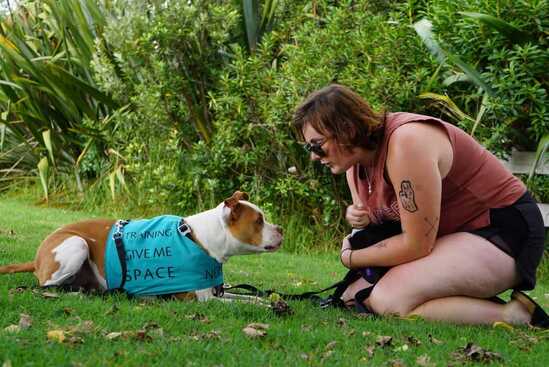|
There comes a lot of responsibility when you start training your dog. For one, you feel like you should make really quick progress, because well, you’re doing more than most people, right? At the very least, they should be better than the average dog you see out in the street. Reactions, lead pulling, jumping on people, we notice every moment they do something we don’t like! And there is a pressure to never have those hiccups occur.
That pressure can be internalised, but also come from external sources. We pressure ourselves (and we’re always our own worst critics), but it always feels like there are other people’s eyes on you and on what your dog is doing. I’m here to break it to you. We cannot have perfect dogs, as pet owners and dog trainers. While part of it is that we should always be learning and trying to improve, there is no such thing as perfection anyway. It may come as a surprise to some, but owning a dog is an extreme time investment in ways people don’t realise. It’s truly homeschooling, around people’s regular 9-5, having families, hobbies, vacations, and everything else that’s on our plates. If you happen to have a dog with behaviour problems (and this can be the luck of the draw), or if you decide to involve yourself in something extra like dog sports, there is even more pressure on already tight schedules. But coming home and not feeling the motivation to work with your dog, is a downfall in itself. For me, as an owner of a reactive dog, I often feel like I am letting Charlie down by not being able to get up and do a training session with her. She is readily accessible to me, and I will learn a huge amount from working hands on with a dog who needs that work, and a lot of days I don’t feel up to it. That, in turn, is a guilt ridden cycle of ‘This is my job it should be easy for me’, and ‘I’ve already done this all day I don’t have the mental and emotional capacity to do so’. If you don’t work with dogs, a reactive dog is still emotionally taxing, especially if you are not seeing the progress you desire or seem to have come to a standstill. Even if you have a relatively regular dog, there’s always a pressure of wanting the best for your furry pal. Whether it is training in dog sports, providing more enrichment, training cooperative care methods, or tidying up some manners, there is always more you could be doing. It comes to a point where we need to be easier on ourselves. Our daily plates can only be filled so much. The saying, ‘anything is better than nothing’, comes to mind. We can look at delegating our time more effectively. Working smarter, not harder. Planning your day, prepping things, and generally giving ourselves grace will mean that the negative cycle becomes slightly more manageable. Five minutes a day while the jug is boiling will show more progress than nothing at all, and seeing even small steps forward, reminds us of how we can succeed. Another thing you can try is asking for help. We are lucky to be surrounded by communities of other dog owners, who likely sometimes feel the same as you. There are trainers with years of experience and knowledge under your belt and the internet at your fingertips (if you know how to filter through the not-so-relevant things). To wrap it up, here is how you can make sure that you don’t feel stagnant in your training journey. Short sessions, ask for help, be kind to yourself and your dog. You’re making headway, no matter what, if you keep trying, so don’t give up.
0 Comments
|
AuthorsArticles created by the team at Allsorts Dog Training, Bay of Plenty, New Zealand Our Library
All
|
Home |
About |
|


 RSS Feed
RSS Feed